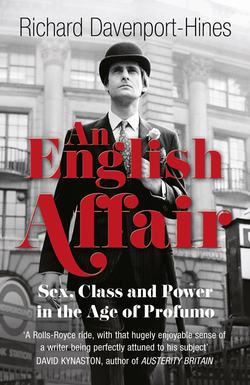An English Affair: Sex, Class and Power in the Age of Profumo

Реклама. ООО «ЛитРес», ИНН: 7719571260.
Оглавление
Richard Davenport-Hines. An English Affair: Sex, Class and Power in the Age of Profumo
RICHARD DAVENPORT-HINES. An English Affair. Sex, Class and Power in the. Age of Profumo
Dedication
Epigraph
Overture
ONE. Prime Minister
TWO. War Minister
THREE. Lord
FOUR. Doctor
FIVE. Good-Time Girls
SIX. Landlords
SEVEN. Hacks
EIGHT. Spies
NINE. Acting Up
TEN. Show Trials
ELEVEN. Safety Curtain
Picture Section
Footnotes
Notes. Overture
PART ONE: CAST. One: Prime Minister
Two: War Minister
Three: Lord
Four: Doctor
Five: Good-Time Girls
Six: Landlords
Seven: Hacks
Eight: Spies
PART TWO: DRAMA. Nine: Acting Up
Ten: Show Trials
Eleven: Safety Curtain
Index
Acknowledgements
Also by Richard Davenport-Hines
Copyright
About the Publisher
Отрывок из книги
For Jenny, Christopher and Hugo, and never forgetting Cosmo
Geoffrey Gorer, ‘This is the English’, The People, 30 September 1951
.....
‘A really remarkable figure,’ Macmillan wrote after a two-hour meeting with Marples in April 1963. ‘I only wish we had more ministers with his imagination and thoroughness.’ However, controversy over the Beeching Axe brought obloquy upon his government, partly because the ministerial presentation was self-advertising, truculent and weak. ‘When Mr Marples presented the Beeching Report,’ noted a future Labour minister, George Thomson, ‘the biggest thing of its kind, we were given to understand, since the Beveridge Report, the operation was intended to show the Conservatives looking forward to the seventies, while the socialists, tied to the railway unions, timorously looked back to the forties. But Mr Marples muffed it monumentally, and suffered a press universally worse than I can remember a minister receiving.’ Macmillan, despite his susceptibility to territorial grandees, was hoodwinked by the bouncy self-promotion of rough diamonds, and the myths of infallibility boomed by self-made men.27
Derick Heathcoat-Amory’s appointment as Chancellor of the Exchequer in 1958 was a better choice by Macmillan than Marples as Minister of Transport in 1959. The assessment of Heathcoat-Amory by Lord Altrincham who, under his later pen name of John Grigg, was one of the canniest political commentators of his generation, had a perfect justness. ‘He is often described as “sound”, an adjective which in this specialised usage connotes a decently concealed intelligence, more than average efficiency, a willingness to take pains (for instance, in not hurting the feelings of moronic colleagues), a belief in good relations between management and the (not so easily) managed, a fine war record and a squirearchical background. There is, indeed, one feature which might make him suspect – he is opposed to the death penalty – but his friends can plead in mitigation that he has been a zealous huntsman. He is the sort of man who not being first-class pretends to be third-class, and so receives a quite disproportionate amount of credit for being top second-class.’28
.....